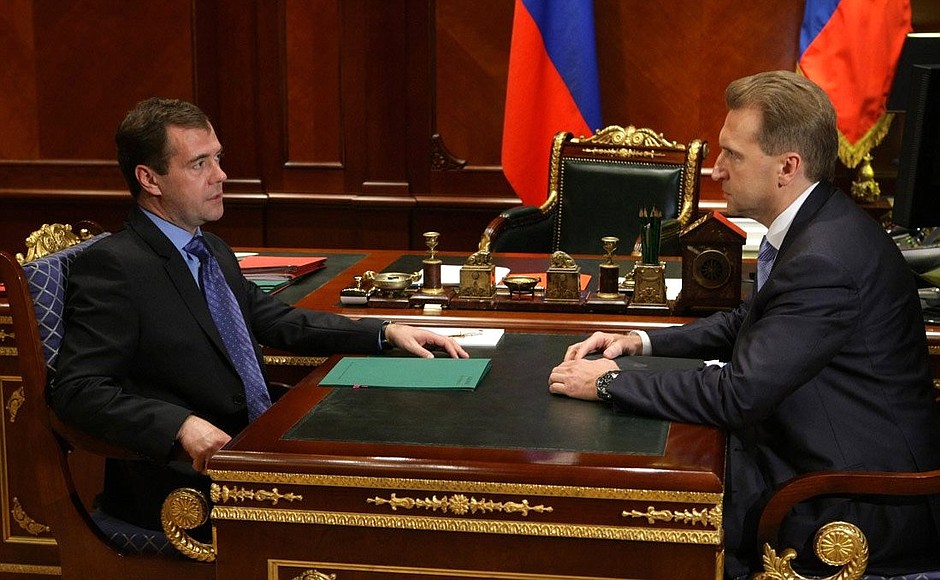
The President called for more intensive efforts on Russia’s accession to the World Trade Organisation and gave the relevant instructions to the Government.
Mr Medvedev also said he has signed three laws regarding the Customs Union between Russia, Belarus and Kazakhstan, and spoke too about the discussion he had on the sidelines of the APEC summit with New Zealand Prime Minister John Key on concluding a free trade agreement between the Customs Union and New Zealand.
On the subject of single-industry towns, the President noted that although the country’s economic situation has stabilised considerably, the 335 single-industry towns in Russia remain in a difficult situation. Mr Shuvalov briefed the President on the Government’s measures in this area.
Dmitry Medvedev also stressed that a case-by-case, targeted approach is needed in dealing with the single-industry towns and their problems, and that private business and regional resources also must become involved in these efforts.
***
President of Russia Dmitry Medvedev: Mr Shuvalov, I had a number of bilateral meetings on the sidelines of the G20 and APEC summits, some of them related to the areas that you are in charge of in the Government.
First of all, regarding our accession to the World Trade Organisation, I discussed this matter with the President of the United States of America and with other colleagues too, including Mr Pascal Lamy, the WTO Director-General. My position is that we should step up our efforts to complete the WTO accession process which I therefore want you to personally monitor. The main decisions have already been taken and the necessary laws signed in order for us to proceed further. But there are still a few nuances to be addressed, and so I want you and your colleagues in the Government to work on this.
Besides, I also spoke with my colleague, Prime Minister of New Zealand, and we came up with a very interesting idea. For the first time in our recent history we are ready to draft a special economic cooperation agreement between the Customs Union formed not so long ago by Russia, Belarus and Kazakhstan, and another country. These proposals are being studied now and we have given all the necessary instructions. So, keep this under your supervision too, for this is an important matter.
Regarding the Customs Union in general I want to inform you that I have signed three ratification laws concerning the agreement on exchange of preliminary information and information on goods and vehicles crossing the customs border, on the customs register of intellectual property items, and on exchange of information between the customs bodies. These are all important elements of the process of building a common customs space and preparing for the subsequent transition to a common economic space. Keep this matter in mind in your contacts with our Customs Union colleagues. This is as far as the international matters go.
Concerning domestic matters, I would like to hear about how the programme on single-industry towns is going so far. The crisis is on the wane now. We think that the international economic and financial system is starting to recover, our country’s economic situation has stabilised considerably, unemployment has gone down substantially, and a number of negative economic trends have been checked, but the situation in the single-industry towns nonetheless remains complex. There is a programme that includes a number of pilot towns where new approaches to aid and support for those working in these towns can be tried out. What has been done so far?
First Deputy Prime Minister Igor Shuvalov: Mr President, I will respond to the WTO issue first, if you permit. You gave the instruction to complete bilateral work with the United States of America by September 30, and this work, as we reported, was completed on time. We settled practically all issues. There is one outstanding point on the American side (which remains to be settled). The Americans are responsible for the delay here. We presented our proposals regarding imports of equipment containing encryption components, but the Americans have not yet held the necessary consultations with businesses and have not yet responded to these proposals.
Dmitry Medvedev: You have to get them moving, because our position was that this work was all but complete.
Igor Shuvalov: Yes, all the issues have been settled and solutions found. You signed the federal laws that were required to be passed.
We will then be setting off to Brussels just before the EU-Russia summit takes place, and will discuss among other things Russia’s accession to the World Trade Organisation. A few issues remain on which we need to find compromise solutions. The Europeans are concerned above all about Russia’s timber exports. As you know, decisions have been taken regarding the fairly high prohibitive duties on Russian timber exports. This was done so as to attract foreign investors into the timber processing industry in Russia, and some projects are already underway. But we realise that WTO accession is the more important task, and so we are now trying to find a compromise solution that would meet the interests of investors already investing here, and not damage companies in the EU countries. We will present these proposals in Brussels and will hold talks over these coming days with the EU commissioners, and I hope that it will be possible to settle this issue once and for all during your talks in Brussels.
Dmitry Medvedev: Since you’ve brought it up, I must say that we do need to find a compromise. I spoke about this with the Finnish President when she was here. We are to reach a compromise. Of course, we have to get this issue sorted out quite fast, but at the same time we do not want to cause serious obstacles for cooperation with our main European Union partners, and so I take the view that the Government will come up with a compromise solution. I have issued instructions to the Economic Development Minister and hope that you will also keep this situation under your control.
Igor Shuvalov: We will do this, Mr President. As I said, we expect that this issue will be settled once and for all during your talks in Brussels.
Regarding New Zealand, the New Zealand government has indeed expressed interest in concluding a free trade agreement. Initially they wanted to sign a free trade agreement with the Russian Federation alone, but after receiving clarifications on the provisions that such an agreement would apply to all three countries in the Customs Union, they have now officially proposed making this agreement with the three Customs Union members. This is an interesting proposal indeed.
Dmitry Medvedev: It certainly is.
Igor Shuvalov: We will advance with this and I hope that an agreement will be ready for signing within the next few months.
Dmitry Medvedev: I think all our partners should be aware, when they look to reach an agreement with Russia alone, that by concluding an agreement of this sort with the Customs Union they get access to not just one market but three. This is of more interest whatever the case than developing trade and relations with just one country. I therefore think we should increase the number of agreements of this kind.
Igor SHUVALOV: This is indeed very important because it offers a bigger market.
Dmitry MEDVEDEV: It’s good for our partners too, for Belarus and Kazakhstan, I mean.
Igor SHUVALOV: Yes.
Dmitry MEDVEDEV: We can not forget about them too.
Igor SHUVALOV: That is true.
What’s interesting is that a year ago a lot of people were asking what the Customs Union is all about, how it differs to the EU Customs Union, and whether it is based on WTO rules and principles, but now our partners no longer ask such questions. The New Zealand government’s initiative is a good sign that our partners are confident that the Customs Union is indeed based on WTO rules and principles and does not contradict them. We will continue this sort of work.
Regarding the Customs Union and its regulations and the new agreements that have just been ratified, you signed the relevant federal laws, and we now have 67 international agreements here, which makes for a very extensive, complex, valuable, and at times contradictory regulation base. We have started to identify certain internal contradictions that came about as a result of our haste in establishing the Customs Union, and we are now in the process of removing these contradictions.
The agreements just signed are important for organising the information exchange between our customs authorities in order to get the information flowing between the three national customs services and prevent any possible abuses.
We have agreed too that Russian customs officers will have the right to be directly present at customs checkpoints on the common customs territory’s external borders, that is to say, on the external borders of the Republics of Belarus and Kazakhstan. These agreements also set out the provisions for carrying out this work and for reciprocal access to the relevant locations.
At the same time, Russia will give Belarusian and Kazakhstani customs officers the right to carry out the relevant checks at our customs checkpoints.
Dmitry MEDVEDEV: This is a new practice, and I think the main thing here is that there must be equal treatment for all, for Russia’s, Belarus’ and Kazakhstan’s services. We have to ensure that various swindlers do not try to take advantage of the new mechanisms and send a stream of shady imports across our common customs border. The Government therefore is to monitor this issue and I will discuss this with my colleagues too.
Igor SHUVALOV: Understood, Mr President. Overall, concerning your instructions on drafting the common economic space agreement, we are progressing with this and hope that when the presidents meet in Moscow in December for the Interstate Council [of the Eurasian Economic Community] we will have these agreements ready for your approval and signature.
Dmitry Medvedev: Good.
<…>
